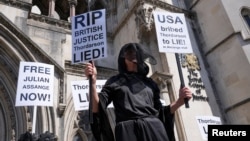The United States government’s attempts to extradite Wikileaks founder Julian Assange from Britain on charges of espionage took another legal twist Monday, as a British court ruled he must be given the right to a full appeal against the order on freedom of speech grounds.
The hearing at London’s High Court on Monday was the last legal hope for Wikileaks founder Julian Assange to halt his imminent extradition to the United States.
Two of the three judges ruled that a full appeal hearing must be held into whether the 52-year-old Australian citizen would be able to rely on the U.S. First Amendment right to free speech, in an American court.
“This is good news because it means that the Julian Assange case can now proceed to a hearing that will substantively consider the freedom of expression arguments,” said Simon Crowther, a legal adviser at Amnesty International.
Assange’s lawyers successfully argued that U.S. government assurances that he could “seek to rely” on those First Amendment rights were inadequate. A new appeal process could take months or years.
Barry Pollack, a member of Assange’s legal team, described the ruling as a significant milestone. “The High Court is going to hear the vitally important issues of whether someone should be extradited to the United States for having published truthful, newsworthy information.”
“The United States should never have brought this case. It is utterly inconsistent with First Amendment values and all that the United States says that it believes. And I hope the United States will take a hard look at this decision and maybe reconsider whether they want [to] pursue this fundamentally flawed case,” Pollack said at a news conference following the ruling Monday.
Assange was not in court Monday due to ill health. His wife, Stella Assange, said it was the correct ruling.
“As a family, we are relieved. But how long can this go on? The United States should read the situation and drop this case now. Now is the moment to do it. Just abandon this shameful attack on journalists, on the press and the public that has been going on for 14 years. This case is shameful, and it is taking an enormous toll on Julian. He is under enormous pressure. He has been in Belmarsh Prison for over five years,” she told hundreds of supporters outside the court.
U.S. prosecutors have filed 18 charges against Assange, relating to allegations of hacking and theft of classified material. They did not immediately comment on Monday’s court ruling.
In 2010, WikiLeaks published thousands of stolen diplomatic cables relating to the wars in Afghanistan and Iraq, which Assange said exposed abuses by the United States military. The U.S. government argues his actions went beyond journalism by soliciting, stealing and indiscriminately publishing classified government documents that endangered innocent lives.
The case sets a vital precedent, said Amnesty’s Simon Crowther. “What Julian Assange is being prosecuted for is something journalists do all the time: they receive classified material that exposes war crimes or alleged war crimes, or crimes against humanity, serious human rights violations. And when it’s in the public interest, they publish those documents,” Crowther told VOA.
Assange has spent the past five years in London’s Belmarsh high security jail.
Prior to that, he sought refuge in the Ecuadorean embassy in London for seven years after Swedish prosecutors charged him with two counts of rape, which he denied. The charges were later dropped. Assange was jailed for breaching his bail conditions. The U.S. Justice Department first formally requested his extradition in 2019.
In the coming months, Assange will have the right to bring a new appeal before the British courts, where he will argue that the U.S. judicial system would deny him his right to free speech.








